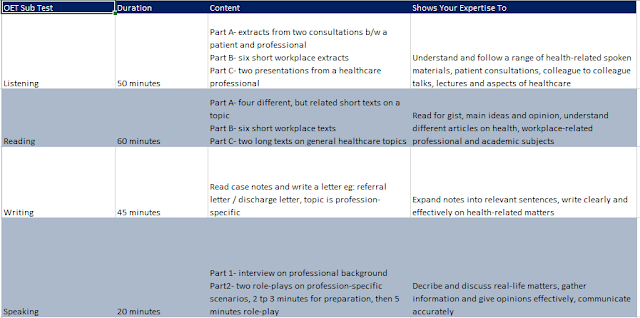Indian nurses who wish to work abroad are often faced with the dilemma to choose the right exam to prove their English language proficiency.
First of all, there are two language tests to prove your English expertise – the International English Language Testing System (IELTS) and the Occupational English Test (OET). The Nursing and Midwifery Council (UK) accepts both these tests to ascertain whether your English knowledge is sufficient to work in the UK.
We get a lot of questions from nurses regarding these tests – which one is easier, which one will suit me more… the list goes on… I’d like to clarify that, at the end of the day, both these tests are designed to determine your expertise in the English language. First, we will analyse the differences and then the similarities between IELTS and OET.
So, what are the differences between IELTS and OET?
- Content (or Context) of the Exam
So, OET tests your knowledge in “healthcare English”. This includes testing your ability to communicate effectively in medical situations, understanding consultation with patients, writing letters (referral/ discharge), understanding and interpreting medical journal etc.
On the other hand, IELTS tests “academic English”. This includes testing your ability to write essays, understanding and interpreting lectures, understanding academic articles, discussing a wide range of issues – which can be social, political, educational, healthcare etc.
- Test Cost and Centers
At the time this article is published, OET exam costs much more than IELTS. The current exam fee for IELTS Academic mode is INR 13500* while that of OET is INR 29000* (approximately).
More exam dates and centers are available for IELTS than OET.
*Fee is expressed in Indian rupees. May vary according to exchange rate.
- Format of the Exam
IELTS Academic has the following exam format:-
The format of the OET exam is as follows:-
- Preparing for IELTS and OET
Preparing for OET includes familiarizing yourself with a multitude of healthcare-related and profession-specific language. The candidate must be able to follow and engage in a variety of medical and clinical scenarios including understanding healthcare-related texts and talks. They must be capable of writing a referral or discharge letter at an advanced level. To acquire these skills, most nurses seek help from a professional OET coaching center.
IELTS Academic preparation involves grasping huge amounts of vocabulary on a wide variety of subjects (not just medical related). The candidates must be capable of reading and understanding texts quickly, understand lectures and discussions, separate facts from opinions. They must be capable of writing essays on a variety of subjects at an advanced language level. These essays must include high-level grammatical structures and complex sentences. To get expertise in the IELTS exam, many candidates rely on reputed IELTS coaching centers.
- Competition Level and Number of Test Takers
In the last year alone, over 3 million people have taken IELTS exam while OET was attempted by tens of thousands. This mere fact itself reflects the specialized nature of OET over IELTS.
- Recognition of Tests
IELTS Academic is recognized by universities, regulatory bodies and companies around the world. Immigration authorities accept IELTS General. Nurses looking for jobs in countries like the UK must take IELTS Academic.
OET is primarily recognized by healthcare regulatory bodies and healthcare-education bodies. OET is accepted in the UK, Ireland, New Zealand, Dubai, Ukraine, Namibia and Singapore.
- Scoring for IELTS and OET
In each module of IELTS, you are scored out of 9 and the overall score will be the average score in four modules. 9 is the highest band score.
In each OET module, the candidate will be graded between A to E grade, with a numerical equivalent. An overall grade is also calculated. A indicates high expertise in language while E is the lowest.
Let’s have a look at the similarities:-
- Both tests take place on one day
- Both IELTS and OET consists of 4 sub-sections – Writing, Reading, Listening and Speaking
- There is no “pass or fail”. Instead, IELTS candidates will be given a band score out of 9 while a grade between A to E will be given to OET candidates. For a nursing job in the UK, the candidate must have at least IELTS 7 each in Reading, Listening and Speaking and a minimum 6.5 in Writing. For OET, it is B, each in Reading, Listening and Speaking and a minimum C+ in Writing
- Both IELTS and OET were developed in the late 1980s. IELTS is owned by the British Council and IDP OET ownership is shared by Boxhill assessment.

